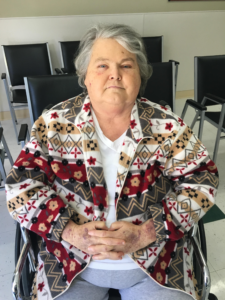
Emily Turner is a dialysis patient living in Benicia. AB 290, if approved, would force the American Kidney Fund to close down their program to help pay for her health insurance.
– Emily Turner is a dialysis patient living in Benicia
For 32 years, I’ve worked as a preschool teacher, including running my own preschool. I truly enjoyed the joys of giving back to others. But now I am feeling forgotten by the very society to which I contributed, as California lawmakers consider a bill sponsored by insurance companies that could potentially end my life-saving kidney dialysis treatment.
I consider myself among the extremely poor, and I rely on a charitable contribution from the non-profit American Kidney Fund to help pay for my health insurance which is vital to pay for my dialysis treatment. My kidneys failed in November after a bout with the flu and I need dialysis three days a week, for three- to four-hours at a time just to stay alive.
Insurance companies, driven by a desire to boost profits, are sponsoring AB 290. If approved, AB 290 would take away the financial assistance I receive today and render me unable to afford the specific diet that my doctors say I need since my kidneys have failed.
AB 290 contains unreasonable and unnecessary provisions that, according to the American Kidney Fund (AKF), would force them to close down their program in California. This would affect 3,700 Californians, all of us low-income and minorities and seniors.
If AKF ceases operations in California, thousands of dialysis patients would lose their private insurance coverage and be forced onto government programs such as Medicare and Medi-Cal. This likely will result in a significant increase in what patients must pay for their own care, since Medicare only covers 80 percent of treatment costs.
At the same time, by forcing thousands of dialysis patients onto Medicare, it could jeopardize the viability of dialysis clinics throughout the state. That’s because Medicare doesn’t cover the full cost of care. The more patients receiving government insurance that doesn’t cover the cost of care means clinics have a harder time keeping their doors open.
This would be devastating in a state where the need for dialysis is increasing and we need to build 350 new clinics over the next 10 years to meet the demand.
AB 290 is purely greed on the part of insurance companies that don’t want to pay for dialysis care which is intensive.
I will live on dialysis for the rest of my life, because high blood pressure makes me ineligible for a kidney transplant. In order to maintain my kidney function levels to survive, I need to eat a high protein diet with plenty of vegetables and fresh food without additives. These are not cheap.
I also need a certain type of clothing to wear to my treatments to enable access to a catheter. Again, this is an added cost. I also use a scooter to help me manage my day to day life including activities most people take for granted, such as making my bed and doing laundry. It also enables me to get around within my apartment complex, which helps me stay social, and better equips me to visit with my five grandchildren, who range from age 3 to 22.
Without the AKF grants, I would not be able to afford all of these costs and the cost of my other medical care and dialysis. Together, these things keep me alive. Without the charitable premium assistance, I would not be able to afford them.
I urge legislators in Sacramento to protect vulnerable patients like me, reject insurance company greed, and vote no on AB 290.






How much are you forced to pay for the special garments for dialysis?
I’m a seamstress and I can help you out.